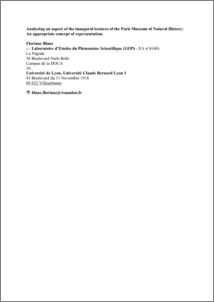Blanc, Floriane
(2007)
Analyzing an aspect of the inaugural lectures of the Paris Museum of Natural History: An appropriate concept of representation.
In: UNSPECIFIED.
![[img]](https://philsci-archive.pitt.edu/style/images/fileicons/application_pdf.png)  Preview |
|
PDF
Analyzing_an_aspect_of_the_inaugural_lectures_of_the_Paris_Museum_of_Natural_History.pdf
Download (172kB)
|
Abstract
This paper presents part of a scientific study focused on the social aspects of research and its impact on the process of constructing knowledge. For this, we use a corpus of hitherto unexploited texts, the inaugural lectures from the Paris Museum of Natural History. This central French teaching institution demanded that each newly appointed professor gave a formal opening lecture, resulting in the source texts. Given to an audience composed by institutional representatives, colleagues and friends, this lecture was a symbolic way to usher the professor into his new function. One might dismiss such a formal and codified exercise as being uninteresting for the epistemologist. Instead, reading these inaugural lectures (1869 - 1979) brings to light “science as it was done”. Indeed, these texts serve to reveal unknown aspects of scientific activity in contrast to the naive image of science one might expect them to present. Certain assertions in these lectures particularly caught our attention. Many words or expressions like “truth”, “coincidence”, “luck”, or the phrase the “first beings made by the hands of the Creator” reveal the personal position of the orator. These elements of the speech generally introduce more epistemologically interesting aspects. In these elements of the lecture, the orator referred to components of a more or less conscious system of thought, which constituted his “representation of the world”. The difficulty was to understand the object - i.e. the “representation of the world” – in all of its dimensions. Moreover, it was necessary to take into account the systemic relationship established between the different components of the study’s object. Thus, we began to research a conceptual construction that would enable us to do this. Either we could have tried to develop a new conceptual tool, or we could have borrowed one from a related science. The concept of “representation” is already used in many disciplines including science studies, sociology, cognitive psychology, history, and social psychology. The concept has been developed according to many different perspectives, which can differ to the point of being opposed. What we propose is neither to add a new definition to the concept, nor to build a rigid model. The aim of this research is firstly to find a suitable model drawn from the approaches developed by some related disciplines, which can be adapted to the present case study. In the first part of the paper, we will present our methodology, explaining which definition was chosen for the concept of “representation” in this study case and why. The second part will be devoted to the presentation of the results obtained by the application of this methodology, i.e. what systems of representation have been revealed. We will present their characteristics and discuss whether or not the conceptualization is valid.
Monthly Views for the past 3 years
Monthly Downloads for the past 3 years
Plum Analytics
Actions (login required)
 |
View Item |



